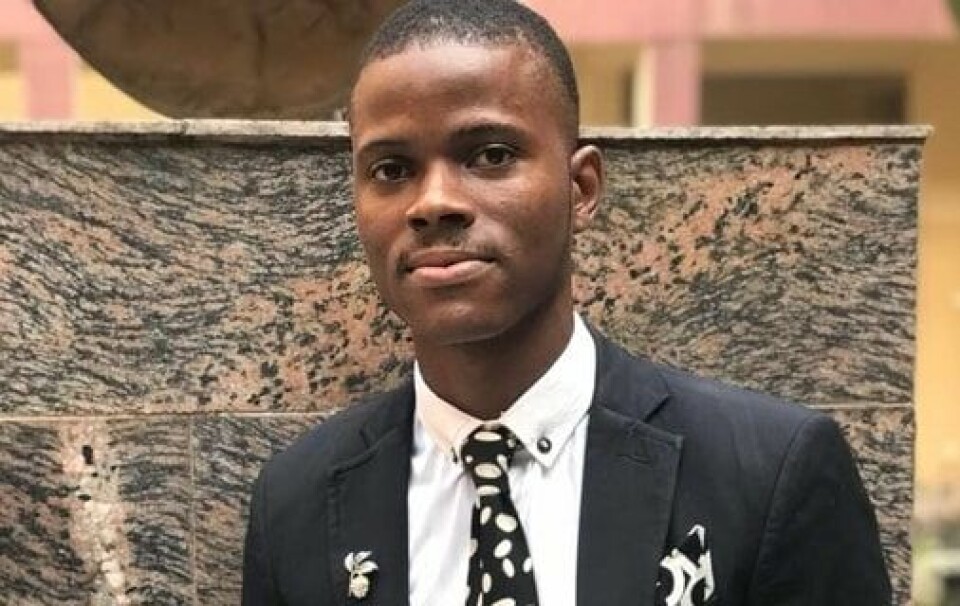Afe Babalola University, in Ado-Ekiti in south western Nigeria, offers one of the top legal educations in the country. The state-of-the art private university, founded in 2009 by the philanthropist Afe Babalola, was described by Nigeria’s National Universities Commission as, “a miracle, model reference point and benchmark” for other institutions.
In this Q&A, final year law student Justice Mbawike, 23, from Imo State in Eastern Nigeria and the son of the lawyer, C.B Mbawike, Esq, describes how he has fallen in love with his profession despite a niggling desire for a military education.
When you complete your studies, what do you want to do?
If I go into practice, I would probably go into litigation and strive to get to the highest point one can get to. That is if I don’t go into the Nigerian Defence Academy (NDA). Some part of me still wants the NDA. (I had wanted to go to the NDA initially, but I had issues getting into the academy. I got into Afe Babalola University and that’s how I came to study Law.)
What is your view on the importance of a strong judiciary in a democracy?
People say that the Court is the last hope of the Common Man, but then I want to add that the Court is the hope of all Man. The judiciary plays a very high role in the movement of a nation. If people allow a judge to pervert justice and the will of the people is being denied, it will backfire on everyone. The judiciary will then make itself a puppet; it will no longer be independent.
What do you think is the role of the lawyer in Nigerian society?
The role of a lawyer goes hand in hand with the Rule of Law. Without the Rule of Law, everything will go wrong. For example, everyone wants to do business in a place where their business is secured. The Rule of Law means that people have to act in accordance with the provisions of the Law. If the Rule of Law is not upheld, things will crumble. If lawyers can uphold their position in making sure that the Rule of Law is upheld-including those at the Bench and in the Bar-Nigeria will transform to our dream.
Do you think Nigeria’s legal system still reflects the era of colonial rule?
Yes, but then even the law is dynamic. There are things that Nigeria, as a Common Law jurisdiction, should change because even the people we’re copying are changing. They’re evolving. Here, we’re still holding on to certain things; there are statutes which have outlived their usefulness which we’re still holding on to. These should be looked into.
Are there any problems with the way the legal fraternity is structured?
It is not bad-pupilage is not bad; seniority at the Bar is not bad. But there are things that should be done away with…that we shouldn’t hold on to. For example, on the issue of being a Senior Advocate of Nigeria - if a person meets the requirements, once it’s time, give it to the person. I feel the way it is, makes room for favouritism and injustice in the whole system. Set a standard; once I get the standard, give me the privilege.
Can legal training in Nigeria be improved?
Yes, there is always room for improvement. I know that the standard of legal education varies. The way it is at one university wouldn’t necessarily be the way it is at another. But, I believe we can improve on the practical aspect of the whole system. Students are only fed on theories. Chamber and Moot Court activities should be made a part of the system. Some students are not good with the cram-and-pass system, but that’s the type of legal education we see. Some people are good with the practical aspect, so I believe Moot and Mock activities should be a part of assessment.
Could technology could play a bigger part in the training of lawyers in Nigeria?
Well, in areas of research…what makes one lawyer different or better than the other is the ability of one to keep abreast of developments in the law. So, if technology is brought into legal education - for example if there is a system or application that updates students on developments in the law, it would be great as it will keep them abreast of legal issues, enactments, that come up in the system.
Can a Pan African network of lawyers would help the growth of democracy on the continent?
Yes, because, even from the time when Africa was still struggling with colonialism, it was through assistance from each other that each nation achieved their independence. So, definitely, unity among lawyers at the continental level will help with the growth of democracy in Africa. The law is like an airplane and I see the lawyers in every society as pilots. If the plane crashes, it will be the fault of the pilot, so I think lawyers should stand up and understand that they pilot society. One act of perversion of justice can go a long way… more than imagined.

